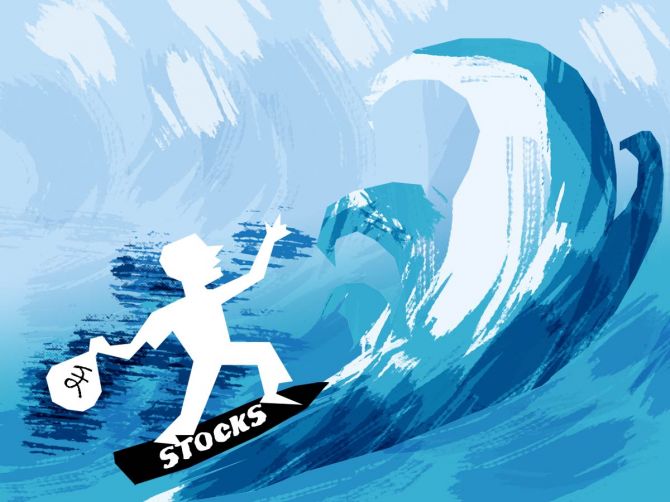 | « Back to article | Print this article |
A sharp rise can be attributed to the significant changes in India's share buyback tax regime, which will come into effect from October 1, 2024.

It's raining share buyback on the bourses as 11 companies have collectively repurchased shares worth Rs 5,388 crore (Rs 53.88 billion) thus far in August 2024.
The amount of shares (in rupee terms) bought back is the highest in 14 months, as per data from Prime Database.
In June 2023, two companies, including Wipro (Rs 12,000 crore/Rs 120 billion), had repurchased shares amounting to Rs 12,005 crore (Rs 120.05 billion).
If one excludes, Wipro, Larsen & Toubro's Rs 10,000 crore (Rs 100 billion) buyback in September 2023, and TCS' Rs 17,000 crore (Rs 170 billion) and Rs 18,000 crore (Rs 180 billion) buyback in December 2023 and March 2022, respectively, the share buyback amount during the current month is the highest since December 2022, when 9 companies had bought back shares worth of Rs 10,606 crore (Rs 106.06 billion), shows data.

A sharp rise (in share buyback quantum), analysts said, can be attributed to the significant changes in India's share buyback tax regime, which will come into effect from October 1, 2024.
The new rules in the Union Budget, presented in July 2024, will shift the tax burden from companies to shareholders, fundamentally altering the landscape for buyback strategies.
Currently, the companies undertaking a buyback have to effectively pay over 20 per cent as buyback tax.
Shareholders tendering their shares, on the other hand, do not attract any tax.
Under the new structure, effective October 2024, however, the entire amount received on buyback of shares would be taxed as dividends in the hands of investors as per their tax slabs.
The cost of acquisition of shares tendered in the buyback will be considered as a capital loss, which will be eligible for set-off against other capital gains or carry forward.
"For investors, taxation on share buybacks could potentially dampen enthusiasm as the income will now be taxed at the same rate as dividends," said Vipul Bhowar, senior director - listed investments at Waterfield Advisors.
"The elimination of the buyback tax will increase corporate cash flow, but the new taxation of buyback income as dividends may decrease interest in share repurchase programs, particularly among cash-rich firms and high-tax bracket investors," explained Bhowar.
"In future, companies might favor dividends over buybacks," Bhowar added.
Among individual companies, five companies -- Indus Towers, Aurobindo Pharma, Welspun Living, TTK Prestige, and Navneet Publication -- have repurchased Rs 4,491 crore (Rs 44.91 billion) worth of shares from their equity shareholders.
Currently, the buyback offers of the remaining six companies -- Symphony, Cera Sanitaryware, Savita Oil Technologies, Dhanuka Agritech, Chaman Lal Setia Exports, and AIA Engineering -- are still open and are scheduled to close on August 30.
The 10 other companies, including Aarti Drugs, Transport Corporation of India, Nucleus Software Exports, KDDC, Technocraft Industries (India), and Mayur Uniquoters -- have approved share buyback proposals, but are yet to announce their schedule for the buyback.
All these companies have announced share buyback on a proportionate basis through the tender offer route.
"Given the changes in the tax treatment post October 2024, I expect payouts via dividends to shareholders to pick up pace as buybacks will lose some of their edge.
"Information technology companies usually resorted to buybacks to reward shareholders, which may slow going ahead," said Ambareesh Baliga, an independent market expert.
Large IT companies, according to analysts at Kotak Institutional Equities, return 70 to 100 per cent of free cash flow to shareholders through a combination of dividend and share buyback.
'TCS and Wipro use a mix of buyback and dividends. Among these, Wipro has the highest dependence on buyback as part of its capital return policy. Companies will exclusively use dividends for return of capital in future,' wrote Sanjeev Prasad, co-head at Kotak Institutional Equities, in a recent note co-authored with Suvodeep Rakshit, Anindya Bhowmik and Sunita Baldawa.
Feature Presentation: Aslam Hunani/Rediff.com